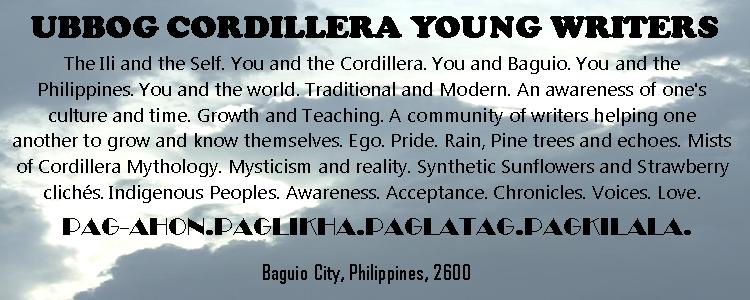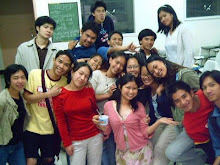LITERATURE is one way to intellectualize a language. The Cordillera literary tradition is an oral tradition; thus, it must not be regarded as a dead institution.
From its communal, oral and ritualistic nature, Cordillera literature has gone through linguistic transition (i.e. the oral tradition transcribed into written form using another language, most often English and Filipino) and transformation into other forms (i.e. folk/cultural songs popularized in modern versions, both in the vernacular and other languages).
The present concern is the advancement of literatures in the vernacular. The undertone of such endeavor is the conviction there are cultural identities and knowledge, which are constituent of vernacular languages.
Locally, this is also a project to enrich Filipino national languages and strengthen Philippine national consciousness -- by incorporating the consciousness and wisdom, not only from Tagalog and other foreign languages (Spanish, Arabic, English, Chinese, Japanese), but more importantly of all the vernacular languages and cultures of the Philippines.
In proclaiming the year 2008 as the International Year of Languages, the United Nations (UN) General Assembly continues to recognize the worth of every language and culture.
The resolution from which the proclamation originated is intended to assert that "genuine multilingualism promotes unity in diversity and international understanding."
This proclamation is a call to urgency. It comes from the threat of the fact more than half of the seven thousand-plus languages spoken in the world may soon disappear.
Language or a linguistic system is imperative in every human activity; because all human actions/relations are social. Thus, even in globalization, all languages, all cultures, matter.
Unesco Director General Koïchiro Matsuura stated, "They (languages) constitute a strategic factor of progress towards sustainable development and a harmonious relationship between the global and the local context." Global, in the first place is rooted in the local.
Thousands of the languages of the world are endangered because of their absence from the "intellectual" field. There are more than a 170 languages that constitute the Philippine Family of Languages belonging to the Autronesian linguistic family.
In the Philippines, only the official languages (English and Filipino), and the eight major languages (Cebuano, Tagalog, Ilokano, Bikol, Hiligaynon, Waray, Kapampangan, and Pangasinan) are "intellectualized", because of their active usage in literature, the education system, and the media.
The University of the Philippines Baguio, in cooperation with the National Commission for Culture and the Arts (NCCA), has initiated the Timpalak Panitik sa mga Wikang Kordilyera (Cordillera Literary Competition), a poetry and short story competition in any of the varieties of Ibaloi, Kankanaey, Bontoc, Ifugao and Kalinga.
The contest is open to all, aged 17 to 30 years.
The deadline for submission of entries is on October 31. For more details, interested individuals and parties may contact the College of Arts and Communication, University of the Philippines Baguio, Gov. Pack Road, Baguio City, telefax (074) 444 83 93, or email cac@mail.upb.edu.ph or junleylazaga@yahoo.com.ph .
The imagining of the Philippine nation (to use the concept of Benedict Anderson) ought to be rooted in all the ethnolinguistic communities of the land.
With this, we hope the Cordillera cultures are ascertained as a building block of a strong Philippine national identity. We cannot be a confused component of the global culture.
From its communal, oral and ritualistic nature, Cordillera literature has gone through linguistic transition (i.e. the oral tradition transcribed into written form using another language, most often English and Filipino) and transformation into other forms (i.e. folk/cultural songs popularized in modern versions, both in the vernacular and other languages).
The present concern is the advancement of literatures in the vernacular. The undertone of such endeavor is the conviction there are cultural identities and knowledge, which are constituent of vernacular languages.
Locally, this is also a project to enrich Filipino national languages and strengthen Philippine national consciousness -- by incorporating the consciousness and wisdom, not only from Tagalog and other foreign languages (Spanish, Arabic, English, Chinese, Japanese), but more importantly of all the vernacular languages and cultures of the Philippines.
In proclaiming the year 2008 as the International Year of Languages, the United Nations (UN) General Assembly continues to recognize the worth of every language and culture.
The resolution from which the proclamation originated is intended to assert that "genuine multilingualism promotes unity in diversity and international understanding."
This proclamation is a call to urgency. It comes from the threat of the fact more than half of the seven thousand-plus languages spoken in the world may soon disappear.
Language or a linguistic system is imperative in every human activity; because all human actions/relations are social. Thus, even in globalization, all languages, all cultures, matter.
Unesco Director General Koïchiro Matsuura stated, "They (languages) constitute a strategic factor of progress towards sustainable development and a harmonious relationship between the global and the local context." Global, in the first place is rooted in the local.
Thousands of the languages of the world are endangered because of their absence from the "intellectual" field. There are more than a 170 languages that constitute the Philippine Family of Languages belonging to the Autronesian linguistic family.
In the Philippines, only the official languages (English and Filipino), and the eight major languages (Cebuano, Tagalog, Ilokano, Bikol, Hiligaynon, Waray, Kapampangan, and Pangasinan) are "intellectualized", because of their active usage in literature, the education system, and the media.
The University of the Philippines Baguio, in cooperation with the National Commission for Culture and the Arts (NCCA), has initiated the Timpalak Panitik sa mga Wikang Kordilyera (Cordillera Literary Competition), a poetry and short story competition in any of the varieties of Ibaloi, Kankanaey, Bontoc, Ifugao and Kalinga.
The contest is open to all, aged 17 to 30 years.
The deadline for submission of entries is on October 31. For more details, interested individuals and parties may contact the College of Arts and Communication, University of the Philippines Baguio, Gov. Pack Road, Baguio City, telefax (074) 444 83 93, or email cac@mail.upb.edu.ph or junleylazaga@yahoo.com.ph .
The imagining of the Philippine nation (to use the concept of Benedict Anderson) ought to be rooted in all the ethnolinguistic communities of the land.
With this, we hope the Cordillera cultures are ascertained as a building block of a strong Philippine national identity. We cannot be a confused component of the global culture.









